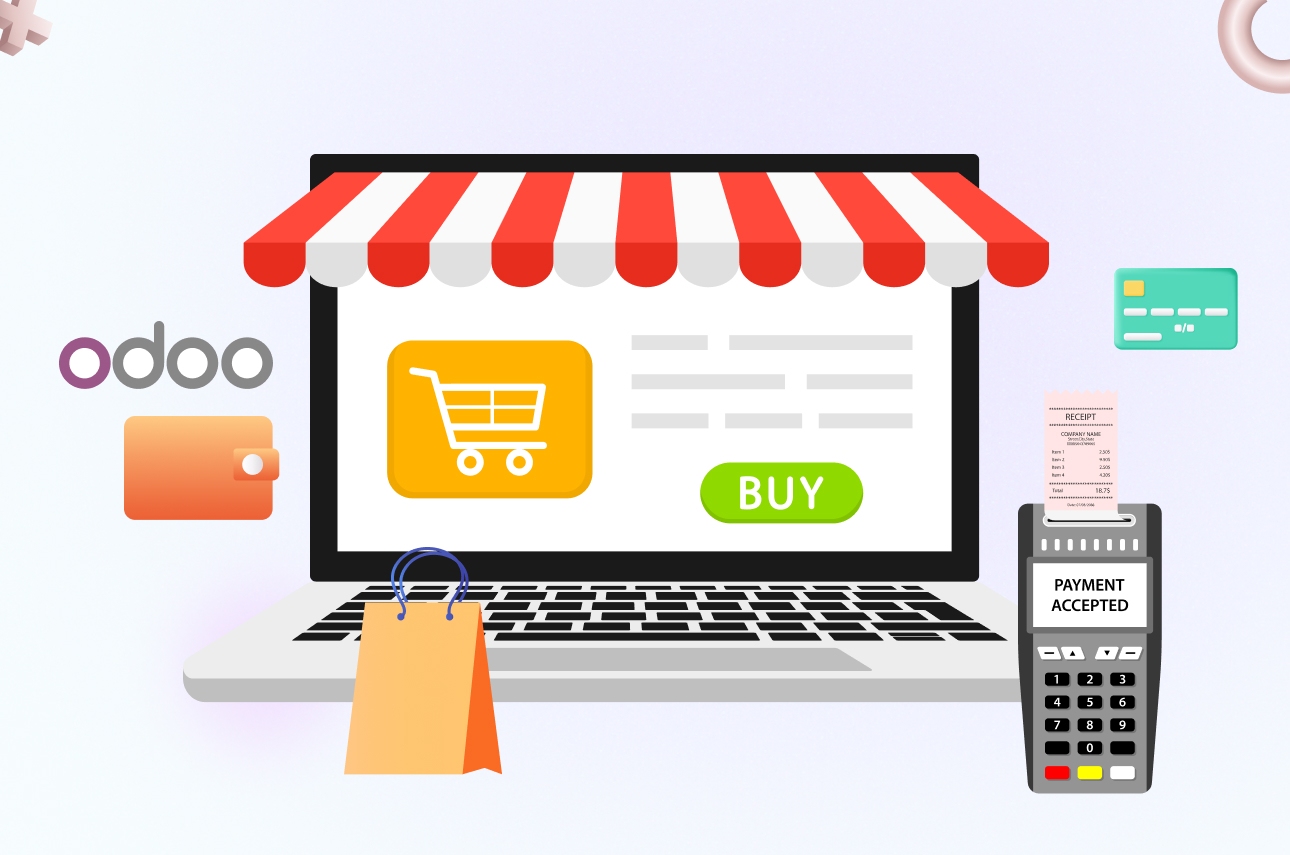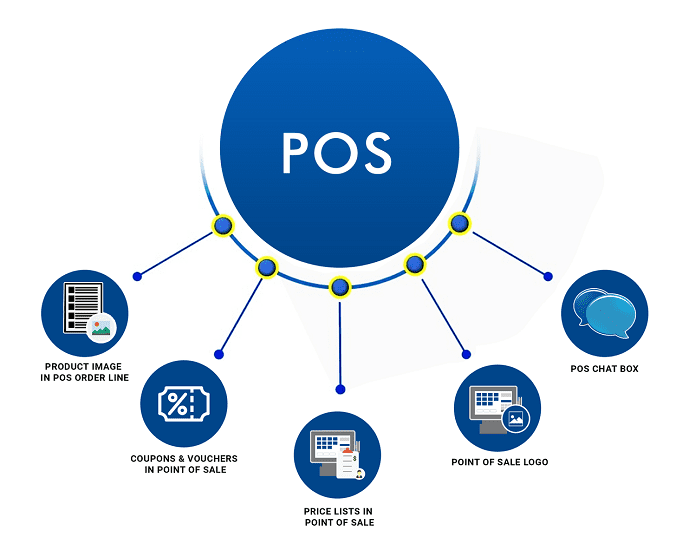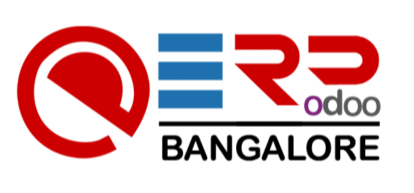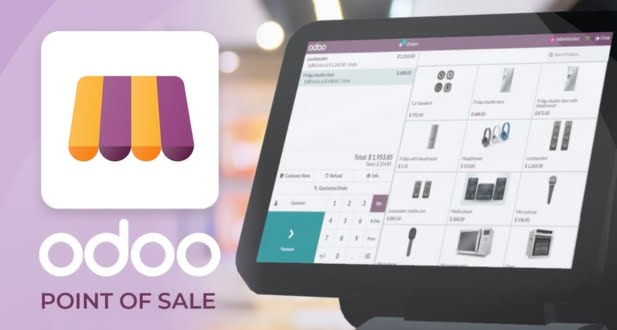Understanding Odoo Point of Sale – Shop
What is Odoo Point of Sale – Shop?
Odoo Point of Sale – Shop is a robust, user-friendly, and fully integrated POS system designed to streamline retail operations across various industries. It serves as a central hub for managing sales, inventory, customer data, and payments, enabling businesses to efficiently handle transactions, enhance customer service, and optimize workflows.
Key Features and Functionalities:
- Intuitive Interface: Odoo POS – Shop boasts an intuitive and user-friendly interface, making it easy for staff to navigate through menus, process transactions, and manage orders swiftly.
- Inventory Management: With real-time inventory tracking, businesses can keep a close eye on stock levels, receive alerts for low stock items, and automate replenishment processes, ensuring optimal inventory control and preventing stockouts.
- Multiple Payment Options: The system supports various payment methods, including cash, credit/debit cards, mobile payments, and gift cards, providing customers with flexibility and convenience during checkout.
- Customer Relationship Management (CRM): Odoo POS – Shop seamlessly integrates with Odoo’s CRM module, allowing businesses to capture customer information, track purchase history, and offer personalized promotions and loyalty programs to enhance customer engagement and retention.
- Reporting and Analytics: Comprehensive reporting and analytics tools empower businesses to gain valuable insights into sales performance, top-selling products, customer trends, and profitability, enabling data-driven decision-making and strategic planning.
Integration with Other Odoo Modules:
One of the standout features of Odoo POS – Shop is its seamless integration with other Odoo modules, creating a unified ecosystem that streamlines business processes and enhances efficiency. Some notable integrations include:
- Inventory Management: Integration with Odoo Inventory module ensures synchronization of stock levels, seamless order fulfillment, and accurate inventory tracking across all channels.
- Accounting: Integration with Odoo Accounting module enables automatic synchronization of sales data, simplifying reconciliation, financial reporting, and tax compliance.
- E-commerce: Integration with Odoo E-commerce module allows businesses to synchronize product catalog, pricing, and customer data between online and offline channels, providing a unified shopping experience for customers.
- Warehouse Management: Integration with Odoo Warehouse Management module facilitates efficient order picking, packing, and shipping processes, optimizing warehouse operations and reducing fulfillment times.
Customization Options and Scalability:
Odoo POS – Shop offers extensive customization options, allowing businesses to tailor the system according to their unique requirements and preferences. Key customization features include:
- Customizable UI: Businesses can customize the POS interface, layout, colors, and branding elements to reflect their brand identity and create a consistent brand experience for customers.
- Flexible Pricing and Discounts: The system allows businesses to configure flexible pricing rules, discounts, promotions, and loyalty programs, empowering them to implement targeted marketing strategies and drive sales.
- Add-on Modules and Apps: Odoo’s vast ecosystem of add-on modules and apps provides businesses with additional functionalities and features to enhance the capabilities of their POS system, such as advanced reporting, customer surveys, and integration with third-party services.
- Scalability: Whether businesses are small startups or large enterprises, Odoo POS – Shop offers scalability to accommodate growth and expansion. The system can effortlessly scale up to support multiple store locations, increased transaction volumes, and complex retail operations, ensuring long-term viability and adaptability.
Conclusion:
Odoo Point of Sale – Shop is a powerful and versatile solution for businesses looking to streamline their retail operations, enhance customer experience, and drive growth. With its rich feature set, seamless integration with other Odoo modules, extensive customization options, and scalability, Odoo POS – Shop empowers businesses to stay ahead of the competition in today’s fast-paced retail landscape. By leveraging the capabilities of Odoo POS – Shop, businesses can optimize workflows, improve operational efficiency, and deliver exceptional value to their customers, ultimately leading to increased profitability and sustainable growth.
Streamlining Operations with Odoo PoS
-
Inventory Management:
Odoo PoS offers real-time tracking of inventory, allowing businesses to monitor stock levels accurately. This real-time visibility enables businesses to make informed decisions about stock adjustments and replenishment. For example, when a product is sold, the system automatically updates the inventory count, ensuring that the information is always up to date. Additionally, businesses can set up alerts for low stock levels, enabling proactive replenishment to avoid stockouts.
-
Sales Management:
Odoo PoS facilitates efficient order processing, invoicing, and reporting. It streamlines the sales process by providing a user-friendly interface for creating and managing orders. Invoices can be generated automatically based on sales transactions, reducing manual effort and minimizing errors. Moreover, comprehensive reporting features allow businesses to analyze sales performance, identify trends, and make data-driven decisions to optimize sales strategies.
-
Employee Management:
Odoo PoS includes features for managing employees, such as user permissions, performance tracking, and scheduling. Businesses can define user roles and permissions to control access to sensitive information and functionalities within the system. Performance tracking tools enable managers to monitor employee productivity and identify areas for improvement. Additionally, the scheduling module helps businesses efficiently manage employee shifts and ensure adequate staffing levels during peak hours.
-
Accounting Integration:
Odoo PoS seamlessly integrates with the Odoo accounting module, enabling accurate financial reporting. Sales transactions recorded in the PoS system are automatically synchronized with the accounting module, eliminating the need for manual data entry and reducing the risk of errors. This integration ensures that financial data is consistent across different modules within the Odoo ecosystem, providing businesses with a unified view of their financial performance.

Driving Business Growth
-
Analytics and Reporting:
This involves utilizing data analytics tools to gain comprehensive insights into various aspects of the business, such as sales performance, customer trends, and inventory turnover. By analyzing this data, businesses can make informed decisions to optimize their operations, identify areas for improvement, and capitalize on opportunities for growth.
-
Scalability:
Businesses need systems and processes that can adapt and grow alongside their expanding operations. Scalability refers to the ability of a business to easily expand its operations and add new stores, products, or services without encountering significant logistical or technical hurdles. A scalable solution ensures that the business can accommodate growth seamlessly without compromising efficiency or performance.
-
Cost-effectiveness:
In today’s competitive business landscape, cost management is crucial for long-term sustainability and growth. Implementing cost-effective solutions, such as modern Point of Sale (PoS) systems that offer lower total cost of ownership compared to traditional systems, can help businesses optimize their expenses while still meeting their operational needs. Lowering costs allows businesses to allocate resources more efficiently and invest in other areas of growth.
-
Community Support:
Access to a vibrant community of developers and users provides businesses with ongoing support and opportunities for enhancement. Engaging with a community of like-minded individuals and experts allows businesses to exchange ideas, share best practices, and access valuable resources and support. This collaborative environment fosters innovation and ensures that businesses can leverage the collective knowledge and expertise of the community to drive continuous improvement and growth.
Enhancing Customer Experience
-
Omnichannel Retailing: Integrated Online and Offline Shopping Experiences
Gone are the days when shopping was confined to brick-and-mortar stores. With the advent of technology, consumers now expect a seamless shopping experience across multiple channels – online, mobile, and in-store. Omnichannel retailing is about breaking down the barriers between these channels and creating a cohesive experience for the customer.
Imagine browsing products online, adding items to your cart, and then seamlessly transitioning to a physical store to complete the purchase or vice versa. Omnichannel retailing allows customers to do just that. Whether they prefer to shop online, in-store, or on their mobile devices, they can expect a consistent experience with access to the same products, pricing, and promotions across all channels.
For retailers, adopting an omnichannel approach means integrating their online and offline operations, from inventory management to order fulfillment. This enables them to better understand customer behavior, provide personalized recommendations, and offer convenient options such as buy online, pick up in-store (BOPIS) or same-day delivery.
-
Loyalty Programs:
Reward Schemes, Discounts, and Promotional Offers
Loyalty programs have long been a staple in the retail industry, but their significance has only grown in the age of omnichannel shopping. A well-designed loyalty program not only incentivizes repeat purchases but also fosters a deeper connection between the brand and its customers.
Modern loyalty programs go beyond simple points-based systems. They leverage data analytics to segment customers based on their preferences and purchase history, allowing for targeted and personalized rewards. Whether it’s exclusive discounts, early access to sales, or birthday surprises, these incentives make customers feel valued and appreciated.
Moreover, loyalty programs serve as a valuable source of customer data, providing insights into shopping habits, preferences, and trends. Retailers can use this data to refine their marketing strategies, tailor product offerings, and ultimately drive revenue growth.
-
Customer Relationship Management:
At the heart of every successful omnichannel strategy is robust customer relationship management (CRM). CRM systems enable retailers to centralize customer data, including profiles, purchase history, and interactions across various touchpoints.
By consolidating this information into a single platform, retailers gain a 360-degree view of their customers, allowing for more personalized and targeted marketing campaigns. For example, a customer who frequently purchases athletic apparel online might receive targeted ads for new workout gear or invitations to exclusive fitness events.
Furthermore, CRM systems enable retailers to track customer interactions in real-time, enabling them to respond promptly to inquiries, resolve issues, and provide personalized assistance. This not only enhances the overall customer experience but also fosters loyalty and advocacy.
-
Mobile POS:
The checkout process is a critical moment of truth in the customer journey. Long lines, cumbersome payment procedures, and outdated POS systems can all detract from the overall shopping experience. Mobile point-of-sale (POS) solutions offer a solution to these pain points by providing flexible checkout options that improve convenience and efficiency.
With mobile POS devices, store associates can process transactions anywhere in the store, eliminating the need for customers to wait in line at a traditional checkout counter. This not only reduces wait times but also enables retailers to capture additional sales opportunities, such as upselling or cross-selling complementary products.
Mobile POS systems support various payment methods, including contactless payments and digital wallets, catering to the preferences of modern consumers. By streamlining the checkout process and offering a frictionless payment experience, retailers can leave a lasting impression on customers and encourage repeat business.
Future Trends and Innovations

Emerging Technologies Shaping the Future of Retail:
- Artificial Intelligence (AI): AI is revolutionizing the retail industry through personalized recommendations, predictive analytics for inventory management, chatbots for customer service, and facial recognition for personalized in-store experiences.
- Internet of Things (IoT): IoT enables retailers to gather real-time data from connected devices, enhancing inventory management, optimizing supply chains, and enabling personalized marketing through smart devices.
- Blockchain: Blockchain technology ensures transparency, security, and traceability in supply chains, enabling retailers to combat counterfeit products, streamline transactions, and build trust with consumers.
Odoo’s Roadmap for PoS – Shop and Upcoming Features:
Odoo, a suite of business management software, continuously updates its Point of Sale (PoS) module to meet the evolving needs of retailers.
Some upcoming features in Odoo’s PoS may include enhanced integration with e-commerce platforms, advanced analytics for sales forecasting, support for omnichannel retailing, and improved user interface for smoother transactions.
Strategies for Staying Ahead of the Competition and Embracing Digital Transformation:
- Omnichannel Retailing: Integrating online and offline channels to provide a seamless shopping experience across various touchpoints.
- Data-driven Decision Making: Leveraging data analytics to gain insights into consumer behavior, preferences, and trends to make informed business decisions.
- Investment in Customer Experience: Prioritizing customer satisfaction by offering personalized experiences, efficient customer service, and hassle-free shopping journeys.
- Agility and Flexibility: Embracing a culture of innovation and adaptability to quickly respond to market changes and technological advancements.
- Collaboration and Partnerships: Collaborating with technology providers, startups, and other retailers to leverage expertise, resources, and innovations in the retail ecosystem.
Setting Up Odoo Point of Sale

Odoo Point of Sale (POS) is a versatile and powerful solution that offers seamless integration with other Odoo modules, making it an ideal choice for businesses looking to streamline their operations. In this comprehensive guide, we’ll delve into the process of setting up Odoo Point of Sale, covering everything from installation and configuration to customization options and hardware integration.
-
Installation and Configuration:
Setting up Odoo Point of Sale begins with installation and configuration. Odoo provides detailed documentation for installing the POS module, which can be done either on-premises or on the cloud. Once installed, the next step is to configure the POS settings according to your business requirements. This includes setting up store information, tax settings, currencies, and languages.
-
Customization Options:
One of the key strengths of Odoo POS is its flexibility and customization options. Businesses can tailor the POS interface to suit their specific needs and branding requirements. Customization options include modifying the layout and design of the POS screen, adding custom fields for capturing additional information during the sales process, and integrating with third-party apps and services.
-
Adding Products and Categories:
Central to any POS system is the ability to manage products and categories effectively. With Odoo POS, adding products and categories is a straightforward process. Users can easily create new products, set pricing and inventory levels, and organize them into hierarchical categories for easy navigation. Additionally, Odoo supports barcode scanning, making it simple to add products to the system.
-
Defining Payment Methods:
Configuring payment methods is essential for ensuring smooth transactions at the point of sale. Odoo POS supports a wide range of payment methods, including cash, credit cards, and mobile payments. Businesses can define multiple payment methods and configure their settings, such as payment terminals and integration with payment gateways. This flexibility allows businesses to accommodate various payment preferences and streamline the checkout process for customers.
-
Configuring Hardware:
Integrating hardware devices such as barcode scanners, receipt printers, and cash drawers is a critical aspect of setting up Odoo Point of Sale. Odoo provides comprehensive documentation and support for configuring hardware peripherals with the POS system. Whether using standard off-the-shelf hardware or specialized POS devices, businesses can easily connect and configure them to work seamlessly with Odoo POS.
Setting up Odoo Point of Sale is a straightforward process that offers businesses the flexibility and scalability they need to manage their retail operations effectively. From installation and configuration to customization options and hardware integration, Odoo POS provides all the tools and features necessary to streamline the sales process and enhance the overall customer experience. By following the steps outlined in this guide, businesses can harness the power of Odoo POS to drive efficiency, increase sales, and stay ahead in today’s competitive retail landscape.
Tips for Maximizing Odoo POS – Shop

Customization:
- Odoo’s strength lies in its high level of customization. Businesses can tailor Odoo POS – Shop to suit their specific requirements, whether it’s modifying the user interface, adding custom fields, or integrating unique workflows.
- Customization can include adjusting the layout of the point-of-sale interface to streamline checkout processes, adding specific product categories or attributes relevant to the business, or incorporating branding elements for a consistent customer experience.
- By leveraging Odoo’s customization capabilities, businesses can ensure that their POS system aligns perfectly with their operations, leading to improved efficiency and customer satisfaction.
Regular Updates:
- Keeping the Odoo POS – Shop up-to-date is crucial for accessing new features, bug fixes, performance improvements, and security patches.
- Odoo regularly releases updates to its software, introducing enhancements based on user feedback, technological advancements, and market trends.
- By staying current with updates, businesses can take advantage of the latest functionalities that can enhance their POS experience, such as new payment methods, improved reporting tools, or compatibility with emerging hardware devices.
- Additionally, regular updates help in maintaining system stability, ensuring smooth operations and safeguarding against potential security vulnerabilities.
Integration:
- Odoo’s modular architecture allows seamless integration between different modules within the Odoo ecosystem as well as with third-party applications.
- Integration possibilities extend the functionality of Odoo POS – Shop beyond basic point-of-sale operations. For instance, integrating with inventory management modules ensures real-time stock updates and better inventory control.
- Integration with accounting modules streamlines financial processes by automatically syncing sales data, reducing manual data entry errors and saving time.
- Third-party integrations can further enhance the capabilities of Odoo POS – Shop, such as integrating with e-commerce platforms for unified inventory management and omnichannel sales strategies.
- Exploring integration options enables businesses to create a holistic business management solution tailored to their specific needs, improving overall efficiency and productivity.
Conclusion:
Odoo Point of Sale – Shop stands as a comprehensive solution for retailers seeking to streamline operations, enhance customer experience, and drive growth. Its user-friendly interface, robust features, and seamless integration make it a valuable asset for businesses of all sizes. By implementing Odoo POS – Shop, retailers can unlock their full potential and stay ahead in today’s competitive market landscape.









